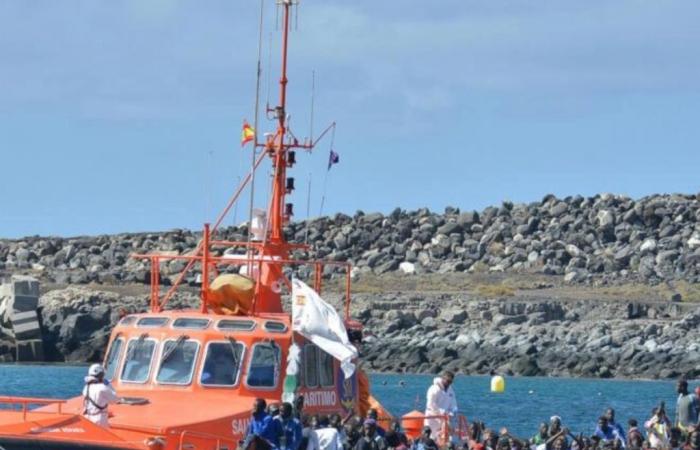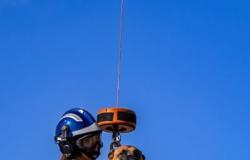
Between January and June 2024, the Interministerial Committee to Combat Irregular Migration (Cilmi) recorded 294 boats arriving in the Canary Islands with 19,260 irregular migrants. Among them, 24 canoes from Senegal. The announcement comes from the permanent secretary, controller general of police Modou Diagne, in a document entitled ”Situation of irregular migration in Senegal”.
To stem the phenomenon of irregular emigration, the former President of the Republic Macky Sall created, by decree no. 2020-2393 of December 30, 2020, the Interministerial Committee to Combat Irregular Migration (Cilmi). For several months, it has been headed by Police Controller General Modou Diagne. The latter, through a document entitled ”Situation of irregular migration in Senegal”, took stock of the situation of this phenomenon which continues to grow in the country.
Between January and June 2024, according to the permanent secretary, the structure he manages recorded 294 boats arriving in the Canary Islands with 19,260 irregular migrants, including 24 canoes from Senegal.
In January this year, 108 boats arrived in the Canary Islands with 7,186 irregular migrants; three canoes from Senegal have been recorded. In February, 72 boats arrived in the Canaries with 4,746 irregular migrants and five canoes from Senegal. In March, 20 boats arrived in the Canary Islands with 1,144 irregular migrants and four canoes from Senegal.
For April, May and June, there were respectively 41 boats arriving in the Canary Islands with 2,786 irregular migrants and four canoes from Senegal, 18 boats arriving in the Canary Islands with 1,180 irregular migrants and three canoes from Senegal, and 35 boats arrived in the Canary Islands with 2,218 irregular migrants, or 5.7% of arrivals from Senegal and the Gambia.
In comparison, during the peak of canoe departures between 2006 and 2009, there were 31,000 migrants aboard 515 boats. No departure of canoes from Senegal took place from 2009 to 2017. There was a timid recovery between 2018 and 2019.
Subsequently, according to him, there was an upsurge in 2020, with the arrival of 41 canoes departing from Senegal; 3,632 Senegalese migrants arrived in the Canaries in 2020. On the other hand, no successful departure took place between November 2020 and July 2021. Departures of Senegalese from the Gambia, Mauritania and Morocco, especially since 2021 , have been noted, with four successful starts in 2021.
In 2023, a peak in departures was noted, with 16 canoes arriving in the Canary Islands from the Senegalese coast during the first half of the year. ”Irregular migration is not an offense in certain countries, the trafficked migrant is not punishable, he is considered a victim. Only administrative measures are applicable to him (refoulement, expulsion, repatriation, etc.)”, underlines the General Controller Modou Diagne in the same source.
Migration by sea
According to the document, by sea, there is the Kayar – Sendou – Fass Boye – Canary Islands axis (four successful departures in 2018); Banjul – Kayar, Sendou, Mbour – Canary Islands axis (several attempts aborted for various reasons: technical problem, loss of landmarks or interception). There were also several departures from The Gambia in 2019 and an increase in departures from Senegal in 2020 (Mbour, Teffess, Joal, Nianning, Saint-Louis, Saloum islands).
Travel costs vary between 150,000 and 650,000 CFA francs per passenger. Four departures were successful in 2021 from Senegal.
In order to better deal with irregular emigration by sea, a system has been set up. This involves the mobilization of air and naval resources of the defense and security forces (police, gendarmerie, navy and air force) as well as those of the Fisheries Protection and Surveillance Directorate, the organization of land, foot and motorized, mixed maritime or rotational, air patrols with a view to preventing attempts to board from the Senegalese coast and the establishment of an operations coordination center at the navy level national.
There is also a duty room which is established at the level of the Ministry of the Interior to ensure the sharing of information between the defense and security forces (FDS) at national level and the Canary Islands Regional Coordination Center as well as a rotating detachment of a liaison officer (national navy, air force, national gendarmerie and national police) for 45 days at the center of Las Palmas, in order to collect and facilitate the sharing of information on departures of illegal migrant boats from the coasts of West Africa as well as the creation of Cilmi as a framework for coordinating the fight against irregular migration.
Cilmi as an institutional response
In order to find solutions for the eradication of this phenomenon which has become a scourge in our country, after decades of implementing strategies as diverse as they are varied, the high state authorities have therefore decided to create an Interministerial Committee of fight against illegal emigration (Cilec) with a new inclusive approach built around a multi-sector and multi-actor strategy, which aims to mobilize State services, grassroots communities and development partners .
On the other hand, Cilmi is a structure for coordinating and monitoring the services responsible for emigration and territorial surveillance. It is a service attached to the office of the Minister of the Interior. Headed by a permanent secretary, it has, in addition to ex officio members of ministries, other state and non-state structures, regional and departmental committees, a deputy, five divisions, 10 offices and a specific secretariat.
Its operation in collegial mode offers a well-balanced platform for concerted and consensual decisions, guaranteeing greater effectiveness of actions. ”This strategy is Senegal’s vision to fight against irregular migration in order to drastically reduce this scourge by 2032. This vision is based on public policies in force and is inspired by the relevant declarations and resolutions to which our country left. It is the result of a long inclusive, consultative and iterative consultation process which brought together public administrations, the private sector, civil society organizations and technical and financial partners engaged in migration management,” informs the boss. of Cilmi in the document.
Concerning the practical arrangements for implementing the action plan, there are three of them. On the legal and institutional level, it will be a question of strengthening the national mechanism for coordinating sufficient human, financial and logistical resources; to accelerate the process of adoption of the new law on the smuggling of migrants by improving the repressive measures against smugglers, conveyors and organizers; to provide a fund to support irregular migrants in transit or in distress and returning; and to set up regional and departmental committees.
On the security front, this will involve strengthening official border crossing points, continuing the modernization of border control and surveillance, making the migratory data collection and analysis center (CCADM) operational, and to strengthen the exchange of intra- and inter-service information in the fight against irregular migration.
On an economic and social level, Cilmi intends to inform, communicate and raise awareness about the dangers of irregular migration and the opportunities for success among the general public and impacted communities, following frameworks compatible with local socio-cultural realities, develop opportunities for regular migration, labor and enter into circular migration agreements, mitigate the root causes of irregular migration through the promotion and development at the local level of the economic and social sectors, promote the fishing sector and to take into account the professional concerns of potential fishermen and fishmongers, and to promote training (technical and professional) and the employability of young people and women.
From October 1, the installation of regional and departmental committees in the departure areas, a meeting with the focal points and the establishment of the committee as a public establishment are planned.
With Enquêteplus.com





